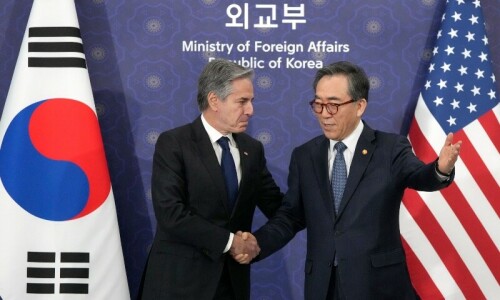RAWALPINDI: For centuries, Rawalpindi has been known as a base camp for visitors to the Kashmir valley, and as a consequence, came to adopt a decidedly Kashmiri flavour in terms of art, culture and cuisine.
During the Mughal era and then the British Raj, Kashmiris would travel to Rawalpindi on their way to areas in Punjab and what is now Khyber Pakhtunkhawa. In the days when they would roam the streets of Pindi freely, Kashmiris brought traditional items, including shawls, woodwork and, of course, the food.
Today, even though the throngs of Kashmiris may be gone from Pindi’s streets, but in the back alleys of Purana Qila, there remains one last bastion of Kashmiri identity whose doors have not closed – the Dilbar Hotel.
Specialising in traditional Kashmiri food, the modest restaurant was opened soon after partition and has been drawn lovers of Kashmiri cuisine to its humble stalls for decades.
 |
| A chef proudly displays the delicacies on offer at Dilbar Hotel. Aslam Malik (below) counts the prime minister among his regular customers. — Photos by Tanveer Shahzad |
The most popular items on the menu, even today, are the traditional meat dishes Gushtaba and Aab Ghosht.
The former is a mouth-watering meatball dish with a thick gravy.
Made from minced mutton, the meat is not prepared in a grinder, but rather pounded to tenderness by special wooden hammers.
It is cooked in the traditional way, in a stew of curd, milk and vegetable oil. Lightly spiced and garnished with a dash of saffron, the aromatic dish is a perennial favourite for visitors.
Aab Gosht is made from Yakhni (mutton stock), with a hint of spice – mostly black pepper – added for flavour.
Hareesa and Shab Deg are very popular amongst customers, especially in the winter months.
 |
Hareesa is also a thick mutton stew, while Shab Deg is a mixture of turnips and mutton or beef with spices, tomatoes and onions added to taste. Both dishes are cooked for hours on a low flame, usually through the night.
Palak gosht with boiled rice is a common delicacy that is made in nearly every household across the country. But the Kashmiri recipe for this staple dish is unique and the palak gosht at Dilbar tastes nothing like what your mother makes at home.
“My father, Malik Jamal opened this restaurant in 1947 after he migrated here from the Kapura area of Indian-held Kashmir. The recipes all belong to my great-grandmother,” says Aslam Malik, the owner of this decidedly Kashmiri outpost in the middle of Rawalpindi.
Mr Malik told Dawn his father had served in the British Army and was posted to Burma during World War II, but after partition, chose to settle in Rawalpindi.
“We don’t use machines to prepare our food. We still use copper utensils to cook and use only local Kashmiri onions, known as paral, to add a distinctive flavour. Red chillies are used in most dishes, but some are prepared using black pepper,” he said.
Malik’s claim to fame is most definitely the fondness Prime Minister Nawaz Sharif for the food served at Dilbar Hotel.
“He likes Gushtaba,” Malik says, adding that, “We cooked for him when he was in London, before his return to Pakistan in 2008. Punjab Chief Minister Shahbaz Sharif is also very fond of hareesa and we receive special orders from him whenever he is in Murree.”
“Maulana Fazalur Rehman was also served Aab Gosht last week when he came to see Maulana Ashraf Ali from the nearby Taleemul Quran madressah,” he said.
“From Liaquat Ali Khan to Zulfikar Ali Bhutto, nearly all major politicians have eaten here. Nawab Akbar Bugti and Kashmiri leader K.H. Khursheed have also eaten here. Sheikh Rashid Ahmed is also a regular customer,” he said.
Published in Dawn, November 10th, 2014







































